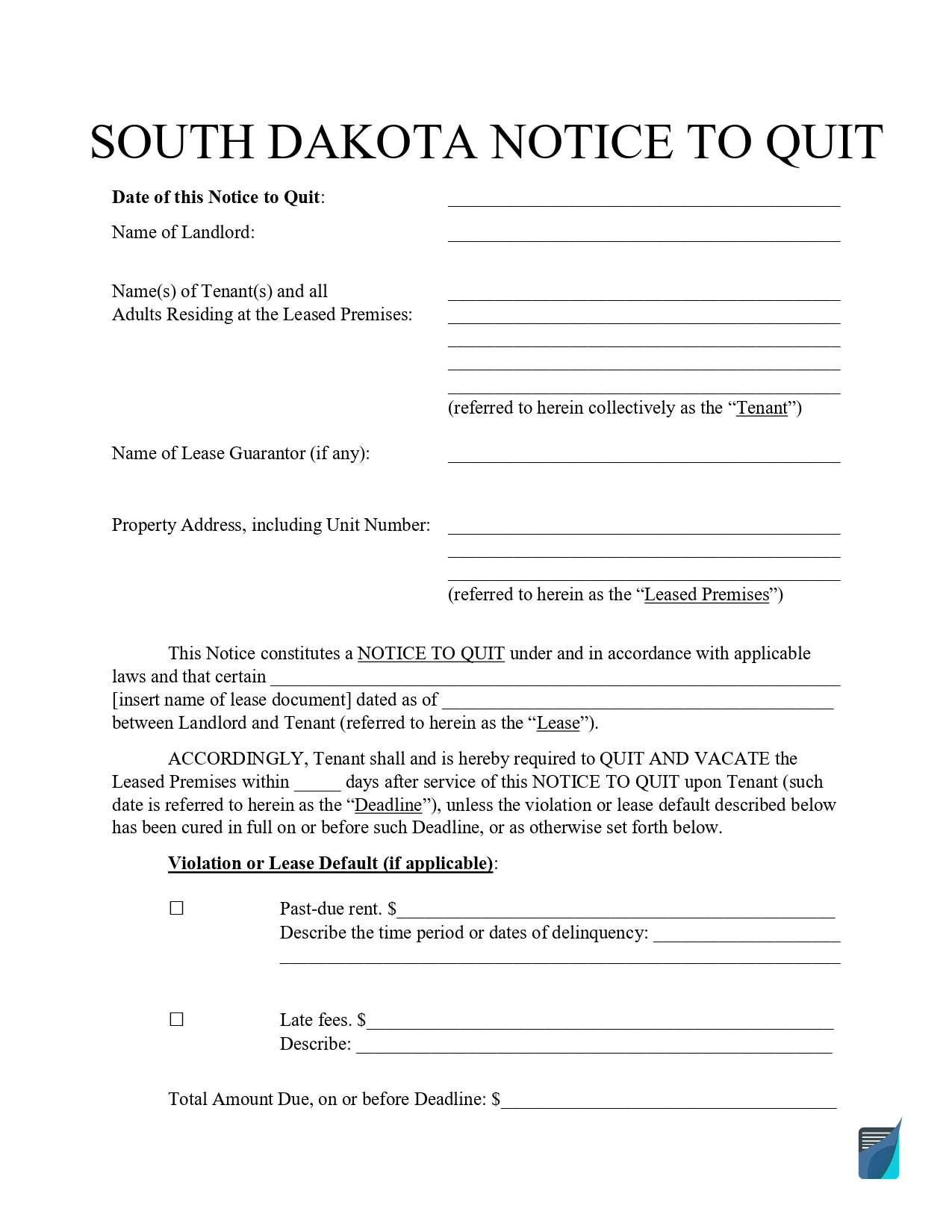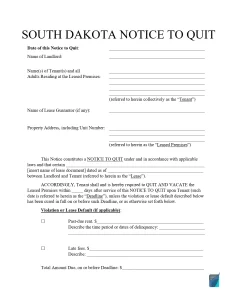South Dakota Eviction Notice Forms
The South Dakota eviction notice is a letter landlords issue to initiate removing a tenant from rentals. This legal form must be provided before vacating, ensuring the tenant knows your intention to reclaim the property. Typically, this notice is required when a person has violated the terms of the rental agreement, such as failing to pay rent or causing significant damage to the property.
In South Dakota, the specific requirements and timeframes for eviction notices vary depending on the nature of the violation. For instance, nonpayment of rent usually warrants a shorter period compared to other breaches of the lease terms. Landlords must adhere strictly to the legal standards set by South Dakota law when preparing and serving an eviction notice.

Build Your Document
Answer a few simple questions to make your document in minutes
Save and Print
Save progress and finish on any device, download and print anytime
Sign and Use
Your valid, lawyer-approved document is ready
South Dakota Eviction Laws
In South Dakota, eviction laws provide a framework for landlords to remove tenants who have violated their rental agreements or whose tenancy has otherwise become untenable. Under South Dakota Codified Law, Section 21-16-1(4), a landlord may initiate an eviction for reasons such as the tenant holding over after the lease has ended or failing to pay rent within three days of it being due.
Further, according to Section 43-32-18, a landlord can terminate a lease before the agreed term ends if the tenant misuses the property or fails to make required repairs promptly after a request. This part protects the rights and interests of the property owner against unauthorized use or neglect of the property.
A specific provision under Section 43-32-36 addresses the misuse of disability claims regarding service animals. This law allows landlords to evict tenants who falsely claim a disability requiring a service animal or who provide fraudulent documentation for such a claim. In these cases, the landlord may also seek damages up to one thousand dollars.
South Dakota Eviction Notice Laws Details
| Rent Grace Period | 3 days (after the same shall be due) |
| Notice of Non-Payment | 3 days |
| Notice of Non-Compliance | Immediate (before the end of a lease term) |
| State Laws | South Dakota Codified Laws, Sections 21-16-1 to 21-16-12 |
Eviction Notice Types Used in South Dakota
In South Dakota, the eviction notice a landlord can use depends on the reason for removal and the type of violation.
3-Day Notice for Non-Payment of Rent
This notice is mandated by section 21-16-1(4) and is used for the most common cause of eviction: failure to pay rent. The tenant has to pay the rent three days after receiving this notice or face eviction proceedings.
Notice for Lease Violations
For situations where a tenant violates lease terms other than non-payment of rent — such as property damage or unauthorized use as outlined in section 43-32-18 — a notice specifying the breach is required. The tenant must remedy the violation within a specified period before eviction proceedings can continue.
Notice for Termination Without Cause
Under Section 43-32-15, if a rental agreement does not specify the lease term and thus is deemed automatically renewable, either party may terminate the lease without cause. The notice must be given well in advance (as long as the rental period itself, but not exceed one month), allowing the tenant ample time to find alternative housing.

Eviction Process in South Dakota
If a tenant fails to comply with an eviction notice, legal options remain available to proceed with a forced removal.
Notice Delivery
The eviction process in South Dakota begins when a landlord delivers a proper notice to the tenant. Based on the type of violation (non-payment of rent, breach of lease terms, or termination without cause), this notice must be given according to specific legal requirements to inform the tenant of the violation and the need to rectify it or vacate the property.
Importantly, Section 43-32-6 outlines that lessors must provide tenants with secure and uninterrupted access to leased properties and essential services. Tenants wrongfully deprived may seek damages or terminate the lease.
Filing the Complaint
If the tenant does not comply with the notice, the landlord can file a formal complaint in either the circuit court or the magistrate court within the county where the property is located, as allowed by Section 21-16-3. The complaint must be written, verified, and served with a summons. South Dakota law requires at least two attempts to serve the summons, spaced at least one week apart but within thirty days. If the second attempt fails, the summons may be posted conspicuously on the property and sent by first-class mail.
Court Proceedings
After the summons is served, the tenant has five days to appear in court and respond, as outlined in Section 21-16-7. The tenant has thirty days to respond if service is made by publication. The trial can proceed quickly, often within days after the response period ends, ensuring swift resolution.
Court Judgment and Eviction
If the court rules in favor of the landlord, as per Section 21-16-10, a judgment for possession of the property and any applicable rents, profits, or damages are issued. This final judgment enforces the tenant’s removal from the property, legally allowing the landlord to reclaim possession. If the tenant does not vacate the property voluntarily, law enforcement can enforce the eviction, ensuring compliance with the court’s order.

Use our document builder to customize any template on FormsPal to your preferences. Here is a number of some other widely-used South Dakota forms we provide.
Other Eviction Notice Forms by State